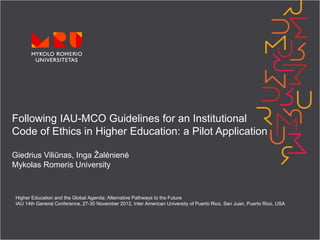
CS II.5 - G. Viliunas
- 1. Following IAU-MCO Guidelines for an Institutional Code of Ethics in Higher Education: a Pilot Application Giedrius Viliūnas, Inga Žalėnienė Mykolas Romeris University Higher Education and the Global Agenda: Alternative Pathways to the Future IAU 14th General Conference, 27-30 November 2012, Inter American University of Puerto Rico, San Juan, Puerto Rico, USA
- 2. Rationales • Persistent need for revitalization of ethical foundations of the University • Implications of massification, commercialization and globalization • Ethical reflection as a stage in development of a new institution
- 3. Background • Expansion of Lithuanian higher education in 1990ties and 2000ties • First generation of Institutional Codes of Ethics in mid-2000ties stimulated by the order of the Minister of Education and Science of 2006: typical structure, communities not involved, some doubtful attitudes multiplied • Revision of Codes after the reform of higher education of 2009: minor corrections
- 4. Mykolas Romeris University Institutional Code of Ethics of 2007 • I. General Principles; II. Common Standarts of Ethical Behaviour of Academic Community; III. Code of Communication Between the Community of the University and the Students; IV. General Norms of Ethical Behaviour of Students; and the V. Rules and Procedures of the Implementation of the Code • Separation of the Academic Community and the Students • Presciptive • Too general • Missing concepts • Procedure of safe reporting absent: “anonimous reports shall not be considered”
- 5. Drivers of New ICE • Institutional strategy of 2009: internationalization, leadership, service to underrepresented groups of the society • Omissions and shortcomings of existing ICE felt in practice • IAU International Conference Ethics and Values in Higher Education in the Era of Globalization: What Role for the Disciplines?, Mykolas Romeris University, Vilnius, Lithuania, November 2010 • IAU-MCO Working Group • Ongoing national debate
- 6. Mykolas Romeris University Draft Institutional Code of Ethics of 2012 • I. General Provisions; II. Underlying values and principles; III. Conflict of Interest; IV. Consideration of Academic Misconduct; V. Hearing of Reports on Academic Misconduct in the Commision of Academic Ethics • Value-centered • Integrative • Descriptive • Explicit definition of misconduct • Clear procedures • Still internally-biased; need for further work on the level of institutional responsibility
- 7. Applicability of IAU-MCO Guidelines • Discrepancy between the notions of ‘Code of (Inter)Personal Conduct’ and ‘Ethical Infrastructure’ • Tacit and explicit academic ethics • ‘Deontological’ and ‘teleological’ element • Tranfserability of ‘corporate’ ethical mechanisms to the University • Guidelines 1.4, 2.2, 3.3 fully integrated • Challenges of integrating institutional responsibility and integrity of teaching, research, AND leadership • Code and procedures • Creating the Ethical Infrastructure
- 8. Suggestions to IAU-MCO Group 1. Spell out more expicitly that the Guidelines apply first and foremost to the institutional practices and not only to rules of (inter) personal behaviour 2. Define core concepts of ‘academic community’ and ‘ethics’ which may vary in different countries and cultures 3. Define the applicability of ICE to interpersonal and institutional levels of conduct. 4. Recommendations on composition and contents of a single ICE dokument may be instrumental to institutions developing or revising their ICEs 5. Discuss the composition of ‘Ethical Infrastructure’
- 9. Recommendations to HEIs 1. Involve all grops of your institution. Do not except Ileadership, administrative staff and students. Take note on the concept of ‘academic community’ 2. Investigate the environment of ICE in your culture and legal system. Discuss macro-, meso- and microlevels of ethical infrastructure 3. Define areas of application. Notice the task of bridging the academic freedom and institutional responsibility; of integrity of research, teaching and leadership & administration 4. Discuss the role of ICE in the system of institutional regulatory acts. Decide upon the implementation mechanisms 5. After the adoption of new ICE, define the tasks of revision of ethical infrastructure of your HEI
- 10. THANK YOU FOR YOUR ATTENTION